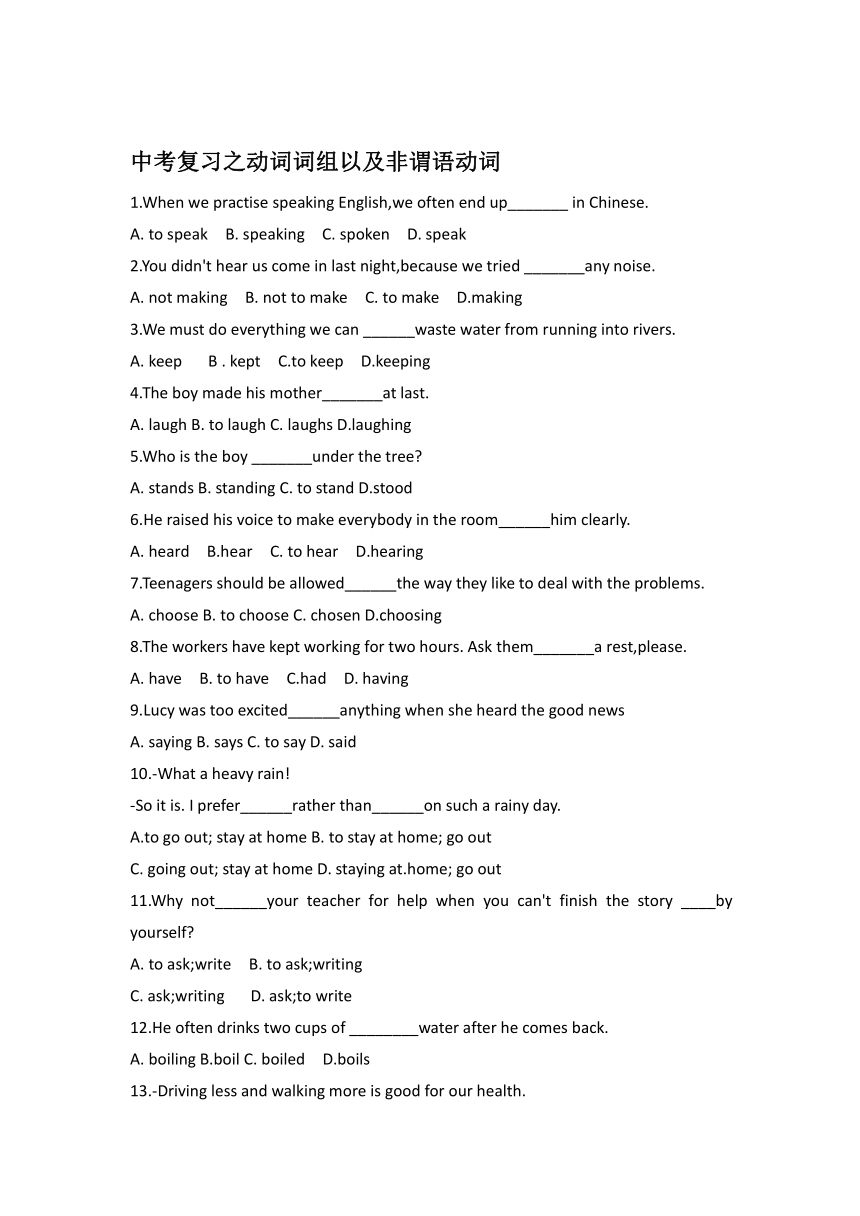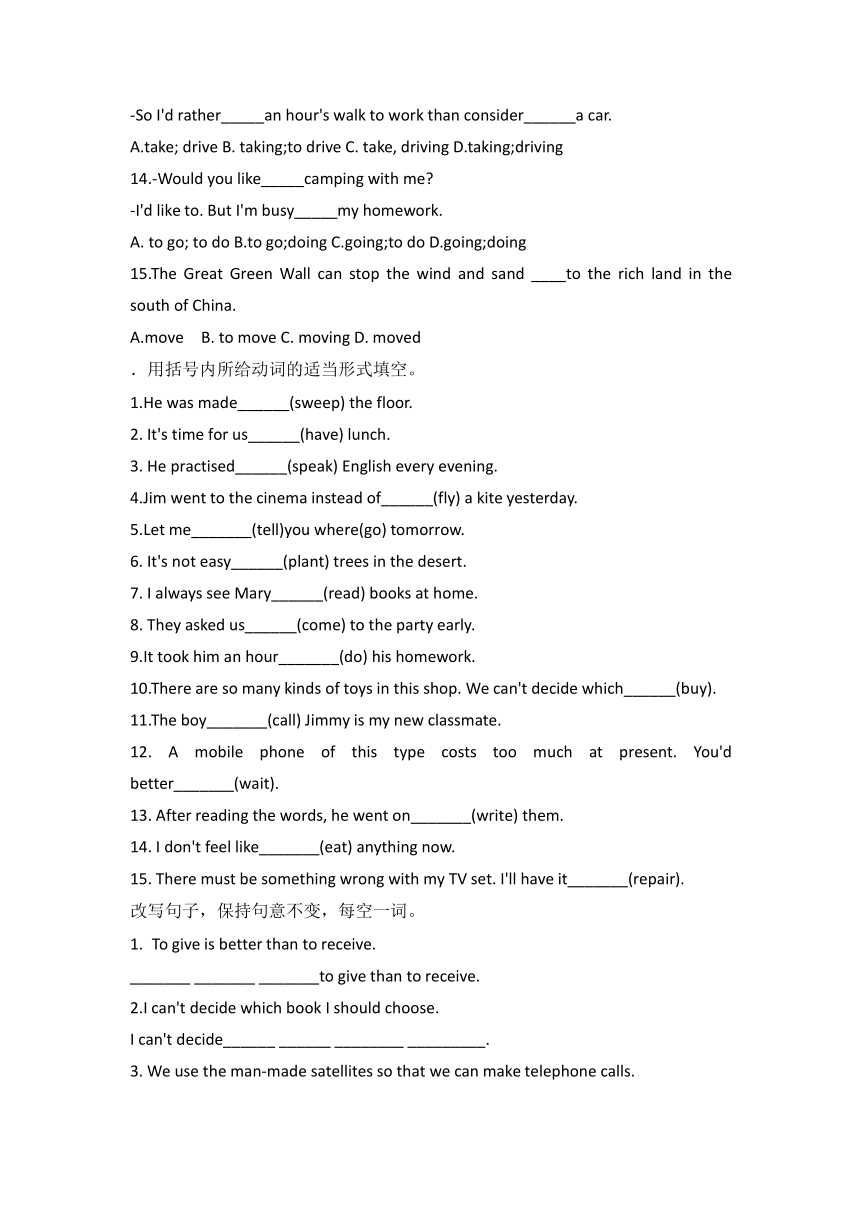2023年牛津译林版中考英语复习之动词词组以及非谓语动词(含答案)
文档属性
| 名称 | 2023年牛津译林版中考英语复习之动词词组以及非谓语动词(含答案) |  | |
| 格式 | doc | ||
| 文件大小 | 17.9KB | ||
| 资源类型 | 教案 | ||
| 版本资源 | 牛津译林版 | ||
| 科目 | 英语 | ||
| 更新时间 | 2023-03-06 15:58:19 | ||
图片预览


文档简介
中考复习之动词词组以及非谓语动词
1.When we practise speaking English,we often end up_______ in Chinese.
A. to speak B. speaking C. spoken D. speak
2.You didn't hear us come in last night,because we tried _______any noise.
A. not making B. not to make C. to make D.making
3.We must do everything we can ______waste water from running into rivers.
A. keep B . kept C.to keep D.keeping
4.The boy made his mother_______at last.
A. laugh B. to laugh C. laughs D.laughing
5.Who is the boy _______under the tree
A. stands B. standing C. to stand D.stood
6.He raised his voice to make everybody in the room______him clearly.
A. heard B.hear C. to hear D.hearing
7.Teenagers should be allowed______the way they like to deal with the problems.
A. choose B. to choose C. chosen D.choosing
8.The workers have kept working for two hours. Ask them_______a rest,please.
A. have B. to have C.had D. having
9.Lucy was too excited______anything when she heard the good news
A. saying B. says C. to say D. said
10.-What a heavy rain!
-So it is. I prefer______rather than______on such a rainy day.
A.to go out; stay at home B. to stay at home; go out
C. going out; stay at home D. staying at.home; go out
11.Why not______your teacher for help when you can't finish the story ____by yourself
A. to ask;write B. to ask;writing
C. ask;writing D. ask;to write
12.He often drinks two cups of ________water after he comes back.
A. boiling B.boil C. boiled D.boils
13.-Driving less and walking more is good for our health.
-So I'd rather_____an hour's walk to work than consider______a car.
A.take; drive B. taking;to drive C. take, driving D.taking;driving
14.-Would you like_____camping with me
-I'd like to. But I'm busy_____my homework.
A. to go; to do B.to go;doing C.going;to do D.going;doing
15.The Great Green Wall can stop the wind and sand ____to the rich land in the south of China.
A.move B. to move C. moving D. moved
.用括号内所给动词的适当形式填空。
1.He was made______(sweep) the floor.
2. It's time for us______(have) lunch.
3. He practised______(speak) English every evening.
4.Jim went to the cinema instead of______(fly) a kite yesterday.
5.Let me_______(tell)you where(go) tomorrow.
6. It's not easy______(plant) trees in the desert.
7. I always see Mary______(read) books at home.
8. They asked us______(come) to the party early.
9.It took him an hour_______(do) his homework.
10.There are so many kinds of toys in this shop. We can't decide which______(buy).
11.The boy_______(call) Jimmy is my new classmate.
12. A mobile phone of this type costs too much at present. You'd better_______(wait).
13. After reading the words, he went on_______(write) them.
14. I don't feel like_______(eat) anything now.
15. There must be something wrong with my TV set. I'll have it_______(repair).
改写句子,保持句意不变,每空一词。
To give is better than to receive.
_______ _______ _______to give than to receive.
2.I can't decide which book I should choose.
I can't decide______ ______ ________ _________.
3. We use the man-made satellites so that we can make telephone calls.
We use the man-made satellites ______ ________telephone calls.
4.We found they were having a football match.
We found _______ _________a football match.
5. They asked someone to wash the car for them yesterday.
They______ the car________yesterday.
根据句意及括号内的汉语提示完成句子,每空一词。
1. It's good_______(帮助)others when they are in trouble.
2.Have you got anything_______ ________(要说)at the meeting?
3.She is_____ _____ ______ ______ _____ _________.(够上学的年龄)
4. He went to school without_________(吃)breakfast.
5. I'm trying to give up_______(吸烟).
6.She didn't know_____ _______ ______ ________(选择哪一件外套).
7.How can you_______the baby_____ ________(使······停止哭)?
8. He has no house_____ ______ ________(居住).
9. The question is_____ _______ ______ ______(下一步做什么).
10.You'd better not read a passage by_________(翻译)every word into Chinese.
答案与解析
一1.B 题意:当我们练习说英语的时候,最后经常会说起汉语。end up意为“最终成为,最后处于”,后接动名词作宾语。
2.B 题意:昨晚你没听见我们进来,因为我们尽量不弄出声音。try doing...“尝试做·····”,try to do...“设法做······”,根据题意可知,应用try not to do。
3.C 题意:我们必须竭尽所能阻止污水流进河流。“我们必须竭尽所能”的目的是“阻止污水流进河流”,故用不定式短语 to keep...作目的状语。
4.A 题意:那个男孩最后把他妈妈逗笑了。make 后用不带 to的不定式作宾语补足语,make sb.do sth.“使某人做某事”。
5.B 题意:站在树下面的那个男孩是谁?the boy与stand是主动关系,且含有动作正在进行意义,故选B。
6.B 题意:他提高了嗓音,以便房间里的每个人都能清楚地听到他。everybody与hear是主动关系,make后用不带to的不定式作宾语补足语。
7.B 题意:应该允许青少年选择他们喜欢的方式去处理问题。allow后用带to的不定式作宾语补足语,allow sb.to do sth.“允许某人做某事”,本题为该结构的被动语态形式。
8.B 题意:工人们已经持续工作两个小时了。请让他们歇一会儿吧。ask sb.to do sth.为固定短语,意为“让某人做某事”。
9.C 题意:当露西听到这个好消息时,她兴奋得一句话也说不出来。too...to...为固定用法,to后跟动词原形,意为“太······而不能······”。
10.B 题意:“雨好大啊!”“确实是。这样的雨天我更愿意待在家里,而不是出去。”prefer to do sth. rather than do sth.“更愿意做某事而不愿意做另外一件事”,为固定短语,由此可排除C、D;由常理可知,下大雨的天气人们一般更愿意待在家里不外出,故选B。
11.C 题意:既然你不能独自写完这个故事,为什么不请求老师帮忙呢?Why not do...?“为什么不做······?”,为固定句型,表示提出建议,故第一空用ask;finish后跟动名词作宾语,故第二空用writing。
12.C 题意:他通常回来后喝两杯开水。“开水”用boiled water表示。boiling表示主动、进行意义,boiling water意为“正在沸腾着的水”;boil和boils不能作定语。
13.C 题意:“少开车、多走路对我们的健康有好处。”“所以我宁愿步行一个小时去上班也不考虑开车。”would rather do sth. than do sth.“宁愿做某事而不愿意做另外一件事”,为固定短语,故第一空用take;consider作“考虑”讲时,后跟动名词作宾语,故第二空用driving。
14.B 题意:“你想和我一起去露营吗?”“我想去。但是我忙着做功课。”would like to do sth.“愿意做某事”和be busy doing sth.“忙于做某事”,都是固定用法。
15.C 题意:这道绿色长城能阻挡风沙吹到中国南方富饶的土地上。stop sb./sth.(from)doing sth.“阻止某人/某事物做某事”,是固定用法。
二.1.to sweep 2. to have 3. speaking 4.flying 5.tell;to go
6. to plant 7.read 8. to come 9. to do 10.to buy
11. called 12. wait 13. to write 14. eating 15. repaired
三. 1. It is better 2. which book to choose 3. to make 4.them having
5. made/had;washed
四. 1.to help
2. to say
3. old enough to go to school
4.having/eating
5. smoking
6. which coat to choose
7. make;stop crying
8. to live in
9. what to do next
10. translating
1.When we practise speaking English,we often end up_______ in Chinese.
A. to speak B. speaking C. spoken D. speak
2.You didn't hear us come in last night,because we tried _______any noise.
A. not making B. not to make C. to make D.making
3.We must do everything we can ______waste water from running into rivers.
A. keep B . kept C.to keep D.keeping
4.The boy made his mother_______at last.
A. laugh B. to laugh C. laughs D.laughing
5.Who is the boy _______under the tree
A. stands B. standing C. to stand D.stood
6.He raised his voice to make everybody in the room______him clearly.
A. heard B.hear C. to hear D.hearing
7.Teenagers should be allowed______the way they like to deal with the problems.
A. choose B. to choose C. chosen D.choosing
8.The workers have kept working for two hours. Ask them_______a rest,please.
A. have B. to have C.had D. having
9.Lucy was too excited______anything when she heard the good news
A. saying B. says C. to say D. said
10.-What a heavy rain!
-So it is. I prefer______rather than______on such a rainy day.
A.to go out; stay at home B. to stay at home; go out
C. going out; stay at home D. staying at.home; go out
11.Why not______your teacher for help when you can't finish the story ____by yourself
A. to ask;write B. to ask;writing
C. ask;writing D. ask;to write
12.He often drinks two cups of ________water after he comes back.
A. boiling B.boil C. boiled D.boils
13.-Driving less and walking more is good for our health.
-So I'd rather_____an hour's walk to work than consider______a car.
A.take; drive B. taking;to drive C. take, driving D.taking;driving
14.-Would you like_____camping with me
-I'd like to. But I'm busy_____my homework.
A. to go; to do B.to go;doing C.going;to do D.going;doing
15.The Great Green Wall can stop the wind and sand ____to the rich land in the south of China.
A.move B. to move C. moving D. moved
.用括号内所给动词的适当形式填空。
1.He was made______(sweep) the floor.
2. It's time for us______(have) lunch.
3. He practised______(speak) English every evening.
4.Jim went to the cinema instead of______(fly) a kite yesterday.
5.Let me_______(tell)you where(go) tomorrow.
6. It's not easy______(plant) trees in the desert.
7. I always see Mary______(read) books at home.
8. They asked us______(come) to the party early.
9.It took him an hour_______(do) his homework.
10.There are so many kinds of toys in this shop. We can't decide which______(buy).
11.The boy_______(call) Jimmy is my new classmate.
12. A mobile phone of this type costs too much at present. You'd better_______(wait).
13. After reading the words, he went on_______(write) them.
14. I don't feel like_______(eat) anything now.
15. There must be something wrong with my TV set. I'll have it_______(repair).
改写句子,保持句意不变,每空一词。
To give is better than to receive.
_______ _______ _______to give than to receive.
2.I can't decide which book I should choose.
I can't decide______ ______ ________ _________.
3. We use the man-made satellites so that we can make telephone calls.
We use the man-made satellites ______ ________telephone calls.
4.We found they were having a football match.
We found _______ _________a football match.
5. They asked someone to wash the car for them yesterday.
They______ the car________yesterday.
根据句意及括号内的汉语提示完成句子,每空一词。
1. It's good_______(帮助)others when they are in trouble.
2.Have you got anything_______ ________(要说)at the meeting?
3.She is_____ _____ ______ ______ _____ _________.(够上学的年龄)
4. He went to school without_________(吃)breakfast.
5. I'm trying to give up_______(吸烟).
6.She didn't know_____ _______ ______ ________(选择哪一件外套).
7.How can you_______the baby_____ ________(使······停止哭)?
8. He has no house_____ ______ ________(居住).
9. The question is_____ _______ ______ ______(下一步做什么).
10.You'd better not read a passage by_________(翻译)every word into Chinese.
答案与解析
一1.B 题意:当我们练习说英语的时候,最后经常会说起汉语。end up意为“最终成为,最后处于”,后接动名词作宾语。
2.B 题意:昨晚你没听见我们进来,因为我们尽量不弄出声音。try doing...“尝试做·····”,try to do...“设法做······”,根据题意可知,应用try not to do。
3.C 题意:我们必须竭尽所能阻止污水流进河流。“我们必须竭尽所能”的目的是“阻止污水流进河流”,故用不定式短语 to keep...作目的状语。
4.A 题意:那个男孩最后把他妈妈逗笑了。make 后用不带 to的不定式作宾语补足语,make sb.do sth.“使某人做某事”。
5.B 题意:站在树下面的那个男孩是谁?the boy与stand是主动关系,且含有动作正在进行意义,故选B。
6.B 题意:他提高了嗓音,以便房间里的每个人都能清楚地听到他。everybody与hear是主动关系,make后用不带to的不定式作宾语补足语。
7.B 题意:应该允许青少年选择他们喜欢的方式去处理问题。allow后用带to的不定式作宾语补足语,allow sb.to do sth.“允许某人做某事”,本题为该结构的被动语态形式。
8.B 题意:工人们已经持续工作两个小时了。请让他们歇一会儿吧。ask sb.to do sth.为固定短语,意为“让某人做某事”。
9.C 题意:当露西听到这个好消息时,她兴奋得一句话也说不出来。too...to...为固定用法,to后跟动词原形,意为“太······而不能······”。
10.B 题意:“雨好大啊!”“确实是。这样的雨天我更愿意待在家里,而不是出去。”prefer to do sth. rather than do sth.“更愿意做某事而不愿意做另外一件事”,为固定短语,由此可排除C、D;由常理可知,下大雨的天气人们一般更愿意待在家里不外出,故选B。
11.C 题意:既然你不能独自写完这个故事,为什么不请求老师帮忙呢?Why not do...?“为什么不做······?”,为固定句型,表示提出建议,故第一空用ask;finish后跟动名词作宾语,故第二空用writing。
12.C 题意:他通常回来后喝两杯开水。“开水”用boiled water表示。boiling表示主动、进行意义,boiling water意为“正在沸腾着的水”;boil和boils不能作定语。
13.C 题意:“少开车、多走路对我们的健康有好处。”“所以我宁愿步行一个小时去上班也不考虑开车。”would rather do sth. than do sth.“宁愿做某事而不愿意做另外一件事”,为固定短语,故第一空用take;consider作“考虑”讲时,后跟动名词作宾语,故第二空用driving。
14.B 题意:“你想和我一起去露营吗?”“我想去。但是我忙着做功课。”would like to do sth.“愿意做某事”和be busy doing sth.“忙于做某事”,都是固定用法。
15.C 题意:这道绿色长城能阻挡风沙吹到中国南方富饶的土地上。stop sb./sth.(from)doing sth.“阻止某人/某事物做某事”,是固定用法。
二.1.to sweep 2. to have 3. speaking 4.flying 5.tell;to go
6. to plant 7.read 8. to come 9. to do 10.to buy
11. called 12. wait 13. to write 14. eating 15. repaired
三. 1. It is better 2. which book to choose 3. to make 4.them having
5. made/had;washed
四. 1.to help
2. to say
3. old enough to go to school
4.having/eating
5. smoking
6. which coat to choose
7. make;stop crying
8. to live in
9. what to do next
10. translating
同课章节目录
- 词法
- 名词
- 动词和动词短语
- 动词语态
- 动词时态
- 助动词和情态动词
- 非谓语动词
- 冠词
- 代词
- 数词和量词
- 形容词副词及其比较等级
- 介词和介词短语
- 连词和感叹词
- 构词法
- 相似、相近词比较
- 句法
- 陈述句
- 一般疑问句和否定疑问句
- 特殊疑问句及选择疑问句
- 反意疑问句
- 存在句(There be句型)
- 宾语从句
- 定语从句
- 状语从句
- 主谓一致问题
- 简单句
- 并列句
- 复合句
- 主谓一致
- 主、表语从句
- 名词性从句
- 直接引语和间接引语
- 虚拟语气
- 感叹句
- 强调句
- 倒装句
- 祈使句
- 句子的成分
- 句子的分类
- 题型专区
- 单项选择部分
- 易错题
- 完形填空
- 阅读理解
- 词汇练习
- 听说训练
- 句型转换
- 补全对话
- 短文改错
- 翻译
- 书面表达
- 任务型阅读
- 语法填空
- 其他资料
